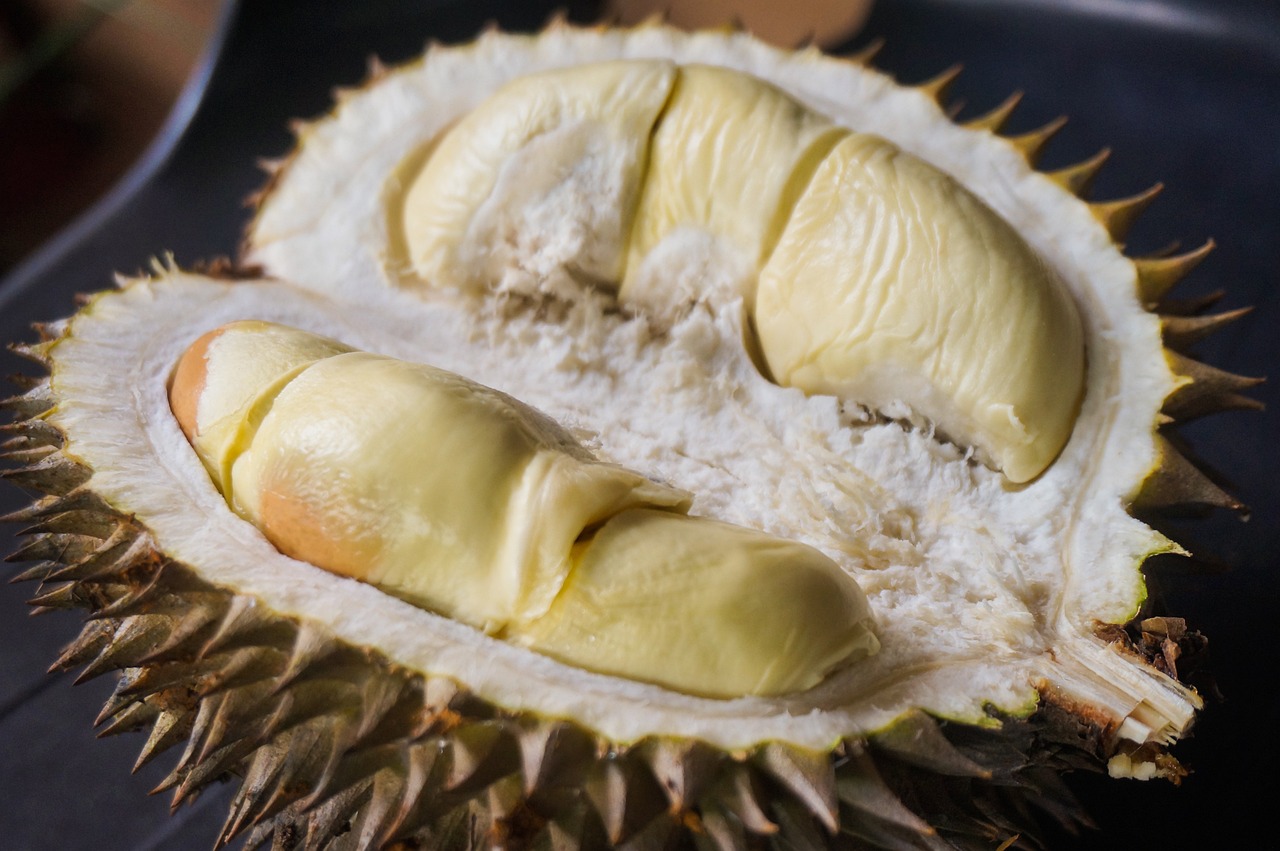Imagine a fruit so unique and captivating that it’s earned the title “King of Fruits.” This is the durian, a fascinating tropical fruit native to Southeast Asia.
This unique fruit boasts a spiky exterior, creamy flesh, and an unforgettable odor that divides opinions like no other. But beyond the smell, durian offers a surprising wealth of nutrients and potential health benefits.
Table of Contents
A Closer Look at the Durian

Durian originates in Southeast Asia, where it thrives in tropical climates. The fruit itself is large and round, covered in sharp thorns that serve as a natural defense against predators.
Cracking open a durian requires some skill and caution, but the reward is a creamy, custard-like flesh with a complex flavor profile. Some describe it as sweet and nutty, while others detect hints of caramel, garlic, or even cheese.
One thing’s for sure: durian’s aroma is unlike anything you’ve ever experienced. Some find it offensive, strong, and even sulfurous. This intense odor has led to durian being banned from public transport and certain buildings in Southeast Asia!
Durian Nutritional Facts
Despite its controversial odor, durian packs a powerful nutritional profile. Here’s a breakdown of some key nutrients per 100 grams of durian:
- Calories: 147 (a moderate source of energy)
- Fat: 5 grams (7% of daily value), mostly healthy fats
- Cholesterol: 0 milligrams (cholesterol-free)
- Sodium: 2 milligrams (very low in sodium)
- Potassium: 436 milligrams (12% of daily value), essential for regulating blood pressure
- Carbohydrates: 27 grams (9% of daily value), including sugars and fiber
- Dietary Fiber: 3.8 grams (15% of daily value), aids digestion and gut health
- Protein: 1.5 grams (3% of daily value)
- Vitamin C: 32% of daily value, a powerful antioxidant that supports the immune system
- Calcium: 0% of daily value
- Iron: 2% of daily value, essential for oxygen transport
- Vitamin B6: 15% of daily value, crucial for energy metabolism
- Vitamin B12 (Cobalamin): 0% of daily value
- Magnesium: 7% of daily value, essential for bone health and muscle function
Durian’s Potential Benefits for Overall Health
The impressive nutrient profile of durian translates to a range of potential health benefits. Here’s a closer look at some of the ways durian might contribute to your well-being:
1. Boosts Immunity
One of its most notable features is its high vitamin C content, providing 32% of your daily recommended intake in just 100 grams. Vitamin C is a powerful antioxidant that strengthens your immune system to help it fight off infections and illnesses.
2. Supports Digestion
Durian contains 3.8 grams of dietary fiber per 100 grams, making it a valuable addition to a fiber-rich diet. Fiber promotes healthy digestion, helps regulate blood sugar levels, regulates bowel movements, and aids the growth of gut bacteria.
3. May support fertility and reproductive healthy
Durian is a source of vitamin B6 (15% of daily value per 100 grams), which plays a role in hormone regulation and can benefit both men and women. Additionally, durian contains potassium, which can contribute to healthy blood flow, potentially supporting reproductive health.
4. May Reduce Blood Sugar Spikes
Although durian is a fruit, it has a lower glycemic index than some other tropical fruits. This means it may cause a slower rise in blood sugar levels, potentially benefiting those with diabetes or pre-diabetes.
5. May Contribute to Heart Health
The potassium and fiber content in durian can help sustain healthy blood pressure levels and promote cardiovascular health. Additionally, the fruit’s antioxidants may help protect against oxidative stress, a risk factor for heart disease.
6. Promotes Bone Health
Durian contains essential minerals like potassium, magnesium, and vitamin C, crucial in maintaining strong and healthy bones. Regular consumption of durian may help prevent bone loss and reduce the risk of osteoporosis.
Important Considerations Before Eating Durian
While durian offers a wealth of potential benefits, it’s important to be aware of a few things before indulging:
- The Smell: As mentioned earlier, durian has a very strong odor that can be offensive to some people. Be mindful of where you consume it, and avoid bringing it on public transport or into enclosed spaces.
- Potential Side Effects: Durian is high in natural sugars and may cause a spike in blood sugar levels if consumed in excess. Additionally, some individuals may experience digestive discomfort or allergic reactions, especially if they have existing food sensitivities or intolerances.
- Interaction with Medications: Durian may interact with certain medications, particularly those that can affect your blood sugar levels. Always consult your doctor before consuming durian if you’re taking any medications.
To enjoy the benefits of durian while minimizing potential risks, it’s recommended to consume it in moderation and consult a doctor if you have any pre-existing medical conditions or concerns.
Enjoying Durian Responsibly: Tips and Tricks
If you’re curious about durian and want to give it a try, here are some helpful tips:
- Seek Out Fresh Durian: The freshest durian offers the best flavor and aroma. Look for a durian with a slightly soft exterior and a sweet smell. Avoid fruits with a sour odor.
- Let the Experts Open It: Durian’s spiky exterior requires careful handling. Ask your local Asian grocer or a durian vendor to open it for you.
- Start Small: Durian’s flavor is intense. Begin with a small amount to see if you enjoy the taste before diving in for more.
- Pair it with Other Flavors: Durian can be enjoyed on its own, but some people prefer to pair it with other flavors to balance the sweetness. Try it with sticky rice, coconut milk, or even a scoop of ice cream.
Final Verdict
While its strong odor may be off-putting for some, durian offers many potential health benefits and a complex flavor profile worth exploring. If you’re feeling adventurous, give durian a try – you might just discover your next favorite fruit!
https://fdc.nal.usda.gov/fdc-app.html#/food-details/168192/nutrients
https://drbrighten.com/vitamin-b6-benefits/
Image by https://pixabay.com/users/najibzamri-7973793/

